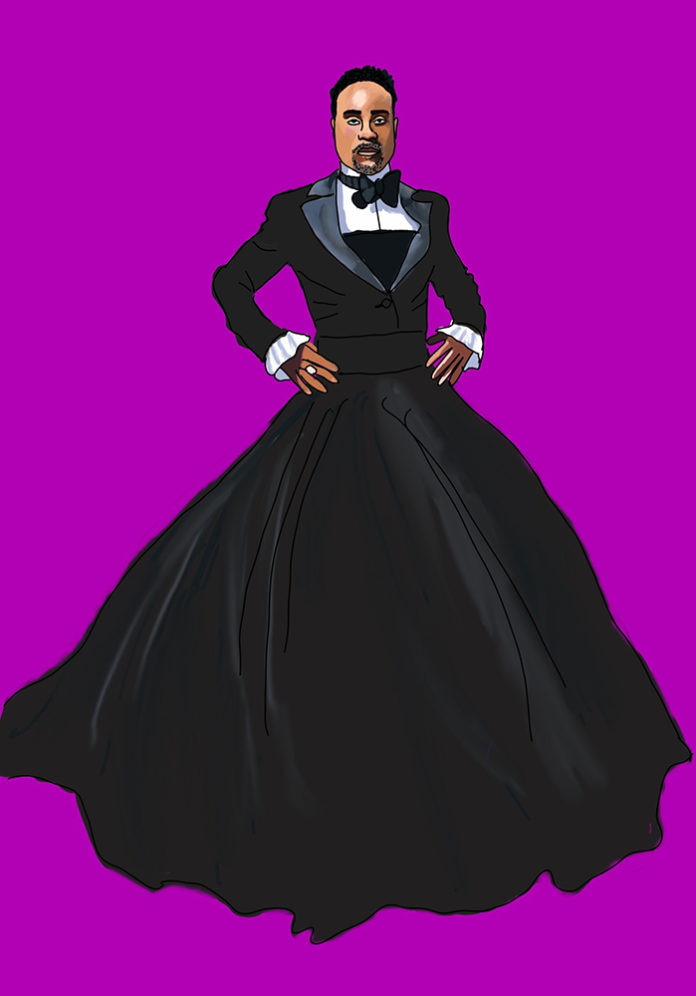The Academy Awards, or the Oscars, are worth more than the $400 production cost of a 24-karat gold-coated statue. To some, the show is the “world’s most important fashion show.” Outlets such as Jezebel, CNN, LA Times and E! News thrive in covering Oscars fashion and identifying the new trends within the fashion business. The red carpet walk, which takes place before the Oscars, is an event within itself where stars show off their designer looks. While it’s fun to admire what people are wearing, the statements behind the clothes are even more important than the clothes themselves. I believe that viewers do not put enough emphasis on how vital fashion statements are. Fashion is more than simply sparkles and ruffles; it’s also about political messages.
In the past, several celebrities have used their clothing to relay a personal political message to a wide audience. In 2017, Ruth Negga wore a blue ribbon on her red dress in support of the American Civil Liberties Union. Negga’s choice to show her support of human rights through fashion related to her Oscar nomination: she was nominated for best actress for “Loving,” in which she portrayed Mildred Loving, a black woman imprisoned for being married to a white man.
Also at the 2017 Oscars, Ava DuVernay’s fashion addressed a political issue. Before revealing her look, she posted a picture of a sweater labeled “Trayvon” in memory of the shooting of Trayvon Martin. Soon after, she posted an image of her dress for the night, explaining how she chose to wear a gown designed by a Lebanese designer and therefore represent a majority-Muslim country. More and more, celebrities recognize their responsibility to address politics, especially in our divisive political environment. These two celebrities show how fashion can take a political stance in response to current events.
The 2019 Oscars were a remarkable time for political messages through fashion. Ruth E. Carter, who reflected her culture through the fashion in “Black Panther,” was the first African-American to win for costume design. She recognized her revolutionary moment at the Oscars by saying, “Thank you for honoring African royalty and the empowered way women can look and lead on screen.” Carter used the publicity of the Oscars to make a political stance about the representation of race and gender, showing how Oscars fashion can be used for something more than aesthetics.
In addition, Billy Porter used his unconventional attire at the 2019 Oscars to make a political statement. He wore a black tuxedo jacket on a strapless black velvet gown designed by designer Christian Siriano. As a gay black man, Porter used his unconventional Oscars attire to communicate his frustration with societal gender stereotypes.
“My goal is to be a walking piece of political art every time I show up. To challenge expectations. What is masculinity? What does that mean? Women show up every day in pants, but the minute a man wears a dress, the seas part,” Porter said.
Porter used his dress to criticize gender roles, which people typically have not dared to do in events as widely publicized as the Oscars. His gown played with the concepts of masculinity and femininity, challenging the gender binary.
Some may argue that these celebrities only act like they care about politics to attract media coverage. These critics, however, fail to consider that the publicity of the Oscars gives celebrities a wide platform to comment on social issues. I believe that some celebrities may not have the most earnest intentions when they make political statements through fashion, but what they wear can still have an impact on the general public. We cannot measure their authenticity, but we can still support the political stances they make. Celebrities have a lot of societal agency through their recurring presence in the media, and it is important for them to use that agency for good; even small changes in people’s mindsets are better than none at all. Porter checked his own influence by owning that he is just trying to start the conversation, not change society’s views with a snap.
The power of fashion is often underestimated, and I am encouraged to see celebrities using fashion more to communicate the injustices they and others face. It is important that we, as viewers, recognize these movements and focus on the greater implications of red-carpet clothing. We must look past the glitz and glamour to see that most things are political — even the Oscars.
Serena Pelenghian is a sophomore Critical Theory & Social Justice major. She can be reached at spelenghian@oxy.edu.
![]()































